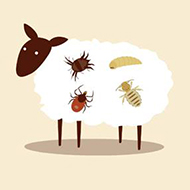
Short video explores different treatments and how to use them correctly
A fun animation has been published by the Moredun Foundation to help explain the four main ectoparasites of sheep.
Created Ping Creates in collaboration with Elanco, ‘Stop the Creeps on Sheep’ (below) explains the different treatment options available and how to use them effectively to control parasites.
The four main ectoparasites of sheep – sheep scab, lice, ticks and blowfly – are endemic in the UK and can cause economic, health and welfare concerns. A lack of understanding about the available treatments, however, can lead to control measures not being fully effective.
“It has been great working with Elanco and Ping Creates to put together this animation, with its fun graphics and clear messages,” said Dr Beth Wells, knowledge exchange specialist at Moredun. “We have found using animation to communicate complex information is valuable in terms of increasing understanding and engagement.”



 The latest
The latest